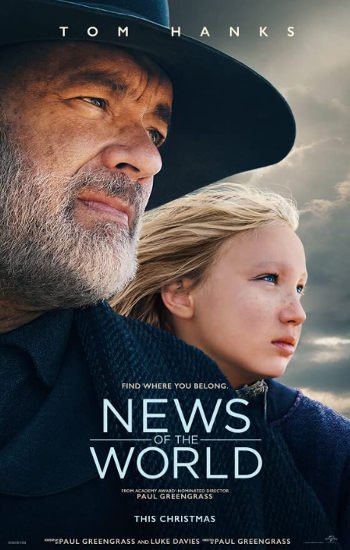 Tom Hanks is Captain Kidd, a former publisher who lost his business while off fighting for the South in the Civil War.
Tom Hanks is Captain Kidd, a former publisher who lost his business while off fighting for the South in the Civil War.
Now he travels from town to town, regaling weary settlers with stories from newspapers across the country, helping them escape for a while, at the cost of a dime.
While traveling between towns, he comes across a black man lynched by bitter Texans. And he finds a frightened young girl (Helena Zengel as Johanna) near the dead man’s wagon.
It turns out she was a Kiowa captive, “rescued” by the cavalry. She was being taken to Castroville to live with an aunt and uncle.
Kidd reluctantly takes on that journey, figuring he can share the news along the way.
But his new twice-orphaned companion is mistrusting of whites and yearns to return to the Kiowa people she knows best and whose language she speaks.
Kidd’s haunted by his own demons. He also lost his wife during the Civil War. While he was off fighting, she died of cholera.
And the trip to take Johanna to Castroville leads him in the direction of San Antonio, where they once dreamed of living a happy life and having children together.
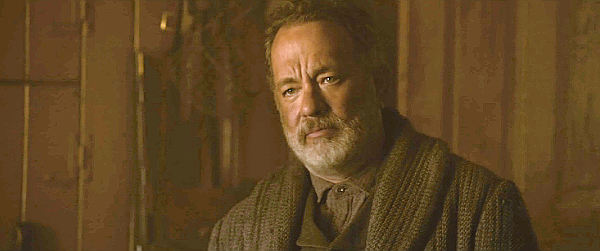
Tom Hanks as Capt. Jefferson Kyle Kidd, delivering Johanna to her new home in News of the World (2020)
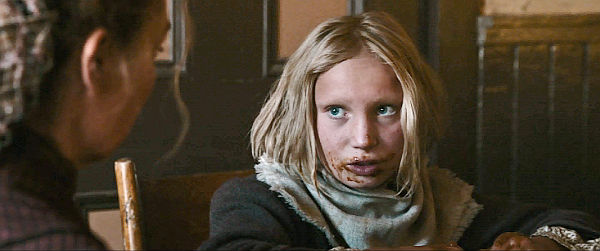
Helena Zengel as Johanna Leonberger, explaining that she no longer has a home in News of the World (2020)
In 2020, it’s simply a thrill to see an original Western with an original plot done on such a grand scale and with such a talented cast.
And that thrill helps overcome the somewhat downbeat tone and rather predictable outcome of the film.
But if it’s downbeat, it’s well-acted and you wind up caring very much what happens to the leading characters.
And if it’s a bit predictable, the ending is also very well done.
The action is provided by the perilous nature of the journey being made by Captain Kidd and Johanna, and by the men twisted by war who they meet along the way.
They include a former Rebel named Almay who wants to buy Johanna away from Kidd so he can turn her into a plaything for any man willing to pay the price.
And — in an obvious bit of 2020 political commentary — they include a tyrant named Farley, who acts as king of his county, determined to fend off outsiders and any “news” that doesn’t follow his narrative.
But in the end, this is a character study of two people, an aging man and a young girl, desperately in need of a new reason to enjoy the present and look forward to the future.
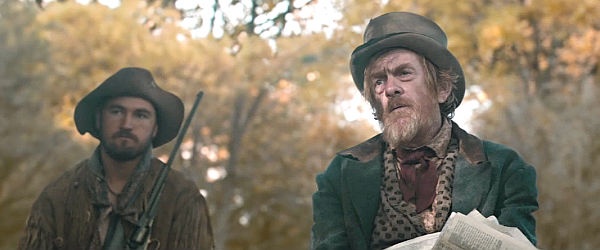
Thomas Francis Murphy as Mr. Farley, telling Capt. Kidd about the new world he’s building in Erath County, Texas, in News of the World (2020)
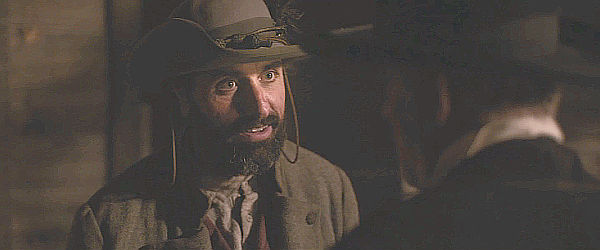
Michael Angelo Covino as Almay, the man who wants to buy Johanna from Capt. Kidd in News of the World (2020)
Directed by:
Paul Greengrass
Cast:
Tom Hanks … Captain Jefferson Kyle Kidd
Helena Zengel … Johanna Leonberger / Cicada
Ray McKinnon … Simon Boudlin
Mare Winningham … Doris Boudlin
Elizabeth Marvel … Ella Gannett
Michael Angelo Covino … Almay
Gabriel Ebert … Benjamin Farley
Fred Hechinger … John Calley
Clint Obenchain … Tom Farley
Thomas Francis Murphy … Mr. Farley
Neils Sandilands … Wilhelm Leonberger
Winsome Brown … Anna Leonberger
Bill Camp … Willie Branholme
Runtime: 118 min.
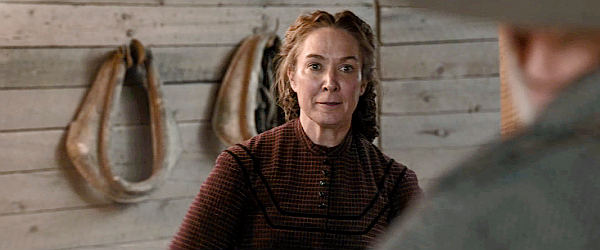
Elizabeth Marvel as Ella Gannett, the first white able to communicate with Johanna in News of the World (2020)
Memorable lines:
Simon Boudlin, of Johanna: “Sure as I live, that child’s trouble. Runnin’ off like that. I said she’s wild. Didn’t I say that?”
Doris: “Please, Mr. Boudlin.”
Simon: “Well it’s the god-damned truth. You just gotta look at her to know. That child’s got a curse on her. Well, shit, captain, what the hell are you gonna do with her?”
Capt. Kidd: “I’ll take her. I found her, I’ll take her. The little girl is lost. She needs to be home.”
Capt. Kidd: “I do not have a clue as to the care of a child. Never had the need. Nor the patience required.”
Ella Gannett: “She’s still alive, ain’t she? That’s not nothing.”
Capt. Kidd, having been taught a bit of Kiowa by Johanna: “A circle? For us, it’s more like a straight line. A line … We’re all journeying across the prairies in a straight line, looking for that place to be. And then when we find it, we go spread out and we plow it and we plant it. All in a straight line.”
One of Farley’s men, inspecting Capt. Kidd’s wagon and finding bullet holes: “Carrying some damage back here.”
Capt. Kidd: “Well, I got the wagon cheap. The holes came with it.”
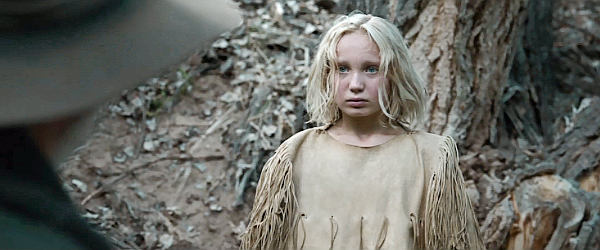
Helena Zengel as Johanna Leonberger, meeting Capt. Jefferson Kyle Kidd for the first time in News of the World (2020)
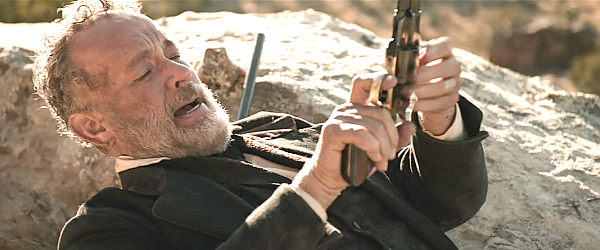
Tom Hanks as Capt. Jefferson Kyle Kidd desperately reloading his pistol as Almay and his men draw closer in News of the World (2020)
Mr. Farley: “You got no idea what we deal with down here. Mexicans. Blacks. Indians. Give ’em an inch, and every one will slit your throat where you piss.”
Capt. Kidd: “The war’s over, Mr. Farley. We have to stop fighting sometime.”
Mr. Farley: “Oh, we will. When it’s ours alone.”
John Calley, after rescuing Capt. Kidd and Johanna from trouble: “I like your stories.”
John Calley: “I tell you, I t’ain’t never heard of news reading as a business before.”
Capt. Kidd: “It’s not a rich man’s occupation, as you can see.”
Anna Leonberger, of Johanna: “So, she thinks she’s an Indian now.”
Capt. Kidd: “Well, something in between. She needs time. Time to adjust.”
Anna Leonberger: “We must try to see her as a blessing. And we need the extra hands.”
Willie Branholme, of Capt. Kidd’s late wife: “It was cholera. There’s nothing you could have done, doctor said.”
Capt. Kidd: “It was being away for four years of war, Willie. Four years of all the killing and all the blood. Of wanting to go home, every day. Of wanting to see her. And feel her. To talk. And laugh. And dream. And think of having a family. Instead, I got a letter delivered to my tent saying she was gone and already buried. That’s when I knew. God’s curse on me had taken her.”
Branholme: “It was sickness, Jeff. Just sickness.”
Capt. Kidd: “It wasn’t sickness. It was judgment. For all I had seen. And all I had done.”
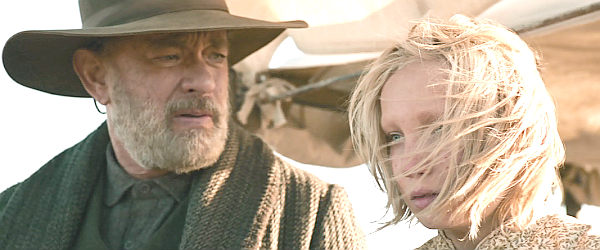
Tom Hanks as Capt. Kidd, encouraging Johanna (Helena Zengel) to remember more about her pre-Kiowa past in News of the World (2020)
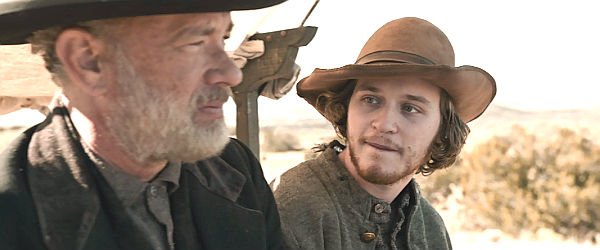
Fred Hechinger as John Calley, learning how Capt. Kidd got into the news reading business in News of the World (2020)
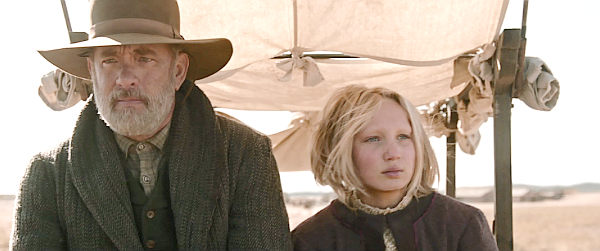
Tom Hanks as Capt. Kidd and Helena Zengel as Johanna Leonberger set out for Castroville in News of the World (2020)

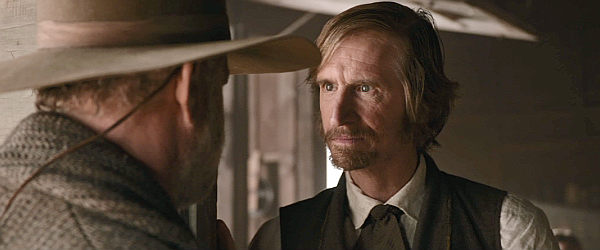
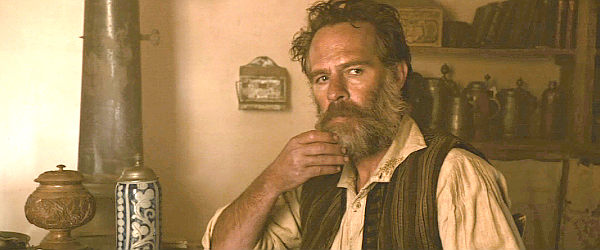
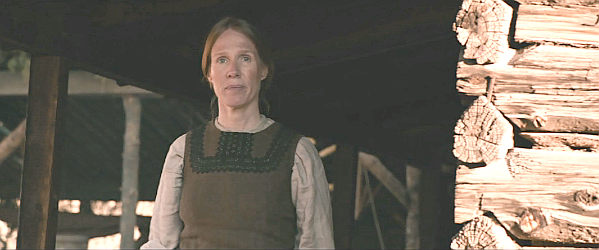
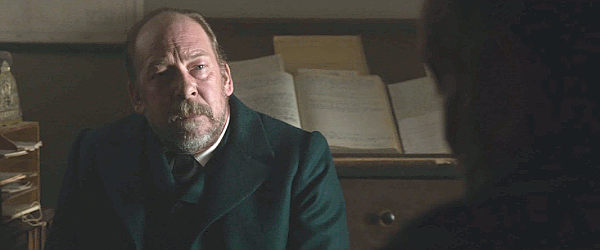
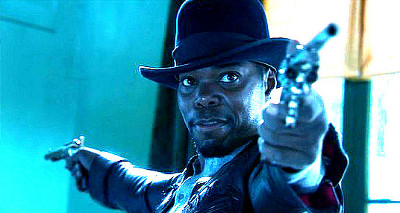
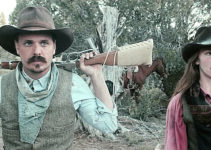
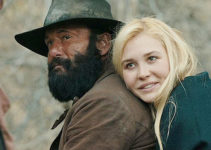
I have yet to see this.
It’s on my menu.
I expect good things.
I wanted to love the book but unfortunately was written without the use of quotation marks!!! Very hard to follow when the dialogue begins and ends (for me at least). I’m sure I’ll love the movie!!! Sounds fabulous